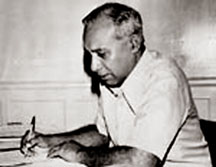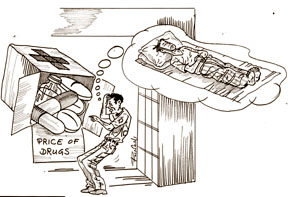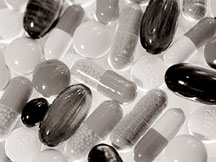
Prof.Senaka Bibile
|
|
 In a
statement released recently, the Organisation of Pharmaceutical Producers of
India, argues that "proper implementation of (a) world class Patent Law will
encourage foreign direct investment, technology transfer, stimulate local
research by Indian and international companies and will be beneficial to the
Indian pharmaceutical industry and finally to the people of India".
In a
statement released recently, the Organisation of Pharmaceutical Producers of
India, argues that "proper implementation of (a) world class Patent Law will
encourage foreign direct investment, technology transfer, stimulate local
research by Indian and international companies and will be beneficial to the
Indian pharmaceutical industry and finally to the people of India".
But the people who need the medicines most will have to pay a heavy price, and not just in India. "India exports approximately Rs. 3,000-crore worth of HIV, asthma, mental health and diabetes drugs to nations such as Africa and Sri Lanka," says Leena Menghaney of Medicines Sans Frontieres, an international organisation providing medical aid. "We're fighting this battle drug by drug. There are people who can't struggle for their right to affordable medicines and will simply die." The Drugs policy that was waged by Dr. Senaka Bibile therefore is still not won.
Seneka Bibile (February 13 1920 - September 29 1977) pharmacologist, was the founder of Sri Lanka's drug policy , which was used as a model for development of policies based on rational pharmaceutical use in other countries as well by the WHO,UNCTAD and the Non Aligned Movement.
 He has
been called the 'greatest medical benefactor of humanity that Sri Lanka has
hitherto produced'.
He has
been called the 'greatest medical benefactor of humanity that Sri Lanka has
hitherto produced'.
This trail blazing legend in his own time, was born at Kathaluwa near Galle. His father was Charles Bibile, a Rate Mahathmaya or Chief Native Feudal Official, his mother Sylvia Jayawardana of Kathaluwa Walauwa, the manor house of the Jayawardana Native Feudal family.
The Bibile family claimed descent from a 16th century Vedda chieftain. He received his primary and secondary education at Trinity College, Kandy, and later entered the Medical College in Colombo, where he had a brilliant career, winning the gold medals for medicine and surgery, and obtained a first class honours degree in 1945. In 1949, he began post-graduate studies at the University of Edinburgh, returning to Sri Lanka in 1952 with a PhD.
His early career in research was indicative of great promise. .He joined the University of Ceylon in 1947, net 1947-49 he led a research team of doctors under the guidance of Prof. Cullumbine, Professor of Physiology.
In 1958 he was selected as the first Professor of Pharmacology and became the head of a new department. He was the first dean of the faculty of medicine at the University of Peradeniya from 1967 to 1977. There he started the first medical education unit in Sri Lanka. He is best known for his advocacy of the government-controlled pharmaceutical purchasing plans often referred to as "rationalisation" of pharmaceuticals and the development of a national pharmaceuticals policy.
He played the leading role in developing such a pharmaceutical policy aimed at ensuring that impoverished people would get reasonable drugs at a low price. A pharmaceutical patenting law is now threatening to disturb this drugs policy. Further, the programs begun by Bibile are aimed towards ensuring that doctors prescribe the minimum required drugs to treat the patient's illness.
A careful selection of drugs was an essential component of the policies he advocated. He was called up by the Minister of Health to address this issue, and prepared the Ceylon Hospital Formulary of about 630 drugs under their generic names almost singlehandedly. Subsequently the National Formulary Committee (NFC), consisting of representatives from the public and private health sectors and the University Medical Schools, was set up with him as its first chairman.
The NFC published Formulary Notes for the use of doctors, which later became The Prescriber. At the time, it was alleged and widely believed that Pharmaceutical companies in the country made considerable money by selling drugs under their trade names, giving out biased information about the branded drugs as against those named generically.
The United Front Government of 1970 appointed Dr. S. A. Wickremasinghe and Dr. Bibile to lead a commission of inquiry to investigate this issue and they recommended the establishment of a national policy and of a state body to regularise the trade.
Accordingly, in 1971 T. B. Subasinghe, the Minister of Industries, appointed Dr Bibile as founder chairman of the Sri Lanka State Pharmaceuticals Corporation (SPC). The SPC channelled all imports of pharmaceuticals.
The SPC also called for worldwide bulk tenders which were limited to the approved drugs listed in the national formulary. The public and private health sectors obtained all their requirements from the SPC. Hence the drug trade was regulated by this body and vendors were forced to compete with each other and with generic drug producers on a cost basis only.
This program is generally perceived to have resulted in a cheaper drug supply for poor countries. This trail blazing policy was supported later by WHO and other UN agencies with enormous benefit to Third World countries.
The UNCTAD Secretariat examined the Sri Lankan experience, concluding that an analysis of the Sri Lankan model could give other developing countries an insight into ways of formulating, developing and implementing integrated national pharmaceutical policies. With Bibile's assistance, UNCTAD published "Case Studies in the Transfer of Technology:
Pharmaceutical Policies in Sri Lanka". This document has proved to be a very valuable guideline for developing countries intending to initiate pharmaceutical reforms. Translated into other languages, it may be found with health planners of almost every Third World country.
Although his policy was watered down by the United National Party Government of 1977, which re-opened the doors to unrestricted imports, the SPC was never dissolved and continued to supply affordable drugs.
In 2005 the United People's Freedom Alliance Government promised to establish a National Medicinal Drugs Policy (NMPD) that would enable Sri Lankans significantly to cut down on drug expenses and get quality drugs at affordable prices while saving billions of Rupees in foreign exchange for the country. Implementation of the NMDP could reduce the number of drugs imported, prescribed and sold in Sri Lanka to about 350 varieties.
Bibile's contribution to development in the area of drugs was acknowledged publicly during the 35th World Health Assembly, in Geneva in May 1982. It has been alleged by some conspiracy theorists that it is possible that the threat he posed to the powerful drugs Multi-nationals may have had some bearing on his premature death in 1977 while on a UN assignment in Guyana to introduce these policies there.
It's not known very much that Bibile was a Trotskyist, a member of the Lanka Sama Samaja Party becoming Treasurer of its Youth Leagues in his early years. He conducted study classes on Marxism at his house in Castle Street, Colombo.
At the height of the language issue crisis, when the LSSP stood for both Sinhala and Tamil being state languages, he agreed to contest a by-election seat in the Colombo Municipal Council as the LSSP candidate, to fight for that principle, risking his life in the process and facing certain defeat in an atmosphere of ethnic animosity.
Dr. Bibile was the author of over 45 publications, including: Bibile, S, and Lall, S, 'The Political Economy of Controlling Transnationals: The Pharmaceutical Industry in Sri Lanka (1972-76)', World Development, August 1977. An oration is held every year in commemoration of Seneka Bibile, under the auspices of the Kandy Society of Medicine.